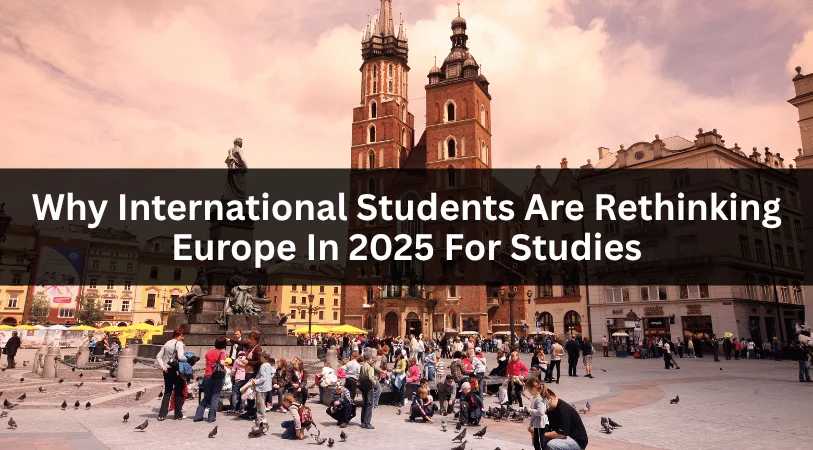Over the last ten years, Europe has become a sought-after location for global students looking for top-notch education. Nations such as Germany, Italy, France, and the Netherlands have regularly drawn thousands of young hopefuls from around the world, including Pakistan, India, Nigeria, and Bangladesh. Nonetheless, starting in 2025, this pattern is experiencing a notable change.
An increasing number of students are reconsidering their plans to study in popular Western European countries due to rising visa complications, stricter immigration policies, housing shortages, and economic changes. As a result, alternative destinations (parts of Eastern Europe) are gaining attention for their smoother visa processes and student-friendly policies.
Let’s explore some of the top Western European destinations for study and understand why they are no longer as accessible to international students as they once were.
1. Germany
Germany has long been a top destination for international students due to its tuition-free public universities and excellent post-graduation job prospects. It consistently attracted students from countries like Pakistan, India, and Nigeria, especially for courses in engineering, business, and medicine.
However, in 2025, the landscape has shifted. Students are now facing extended delays in securing embassy appointments, and the blocked account requirement has increased to over €11,000 per year. These financial and procedural hurdles are discouraging many applicants who would have otherwise been ideal candidates.
What’s more concerning is the rising number of visa denials, even among students with strong academic records. Fields such as medicine and lower-ranked business programs are seeing higher rejection rates, often for unclear reasons like “uncertain plans” or minor document issues. This has left many Pakistani students disheartened and unsure about their prospects in Germany.
2. Italy
Italy’s fully financed scholarships, such as Invest Your Talent and local incentives, rendered it a compelling choice. Nevertheless, because of rising application numbers, the pre-enrollment process has turned very competitive. Students are having difficulty securing timely embassy appointments, and consulates are increasingly selective during student interviews.
Students who are self-funded are significantly impacted, as embassies focus on those with scholarships. Additionally, delays in visa processing frequently lead to students missing university deadlines or having to defer.
3. France
France continues to offer an exciting student life and globally recognized universities. This makes it an attractive destination for international education. Many students choose France for its cultural richness, academic diversity, and career opportunities within the EU.
However, in 2025, the Campus France procedure has become stricter and more detailed. Students must now meet higher standards in academic justification, language skills (with French often preferred even in English-taught programs), and financial documentation. The process demands more clarity and preparation than before.
Despite having strong IELTS scores and admission letters from reputed universities, many students are still facing unexpected visa rejections. Common reasons include vague academic goals or a weak integration plan. This shift has made it essential for applicants to present well-prepared, purpose-driven applications to succeed.
4. Netherlands
Once considered a liberal and highly accessible country for international students, the Netherlands is now limiting the number of English-taught programs. The government has introduced policies to reduce the intake of non-EU students in an effort to prioritize local enrollment.
The ongoing housing crisis in cities like Amsterdam and Utrecht has made it extremely difficult for students to find affordable accommodation, sometimes even resulting in the cancellation of university admission.
5. Scandinavia (Sweden, Denmark, Finland, Norway)
Scandinavian countries like Sweden, Norway, Denmark, and Finland are well known for their exceptional quality of life and world-class education systems. For years, they’ve attracted students pursuing a balanced academic and lifestyle experience in Europe.
However, in 2025, these destinations have become increasingly selective. Rising tuition fees, stricter financial proof requirements, and limited part-time work options are discouraging many international students. These changes have made it harder for average applicants to gain entry.
Currently, Scandinavian universities are prioritizing high-performing students, especially those applying for PhD programs or research-based master’s degrees. For most undergraduate and general master’s applicants, these countries are no longer a practical or accessible study abroad choice.
6. Republic of Ireland
Ireland has long been a top choice for international students, especially those pursuing business and IT programs. However, in 2025, the education sector in Ireland has become oversaturated. It has become more competitive and less accommodating for new applicants.
As living costs continue to rise across cities like Dublin and Cork, students are finding it increasingly difficult to manage their daily expenses. The shortage of part-time job opportunities further adds to the financial strain on international students.
To control growing migration levels, the Irish government has also introduced stricter student visa regulations. These changes are pushing many students to reconsider their plans and look toward more affordable and accessible study destinations in Europe.
Alternative Europe Options
With Western Europe becoming more difficult, many students are now exploring non-traditional or lesser-known countries. These destinations offer simpler visa processes, lower tuition, and more welcoming environments.
1. Cyprus (North)
Cyprus has quickly gained popularity among international students due to its simple visa process and budget-friendly education system. With fewer bureaucratic hurdles, it offers a smoother transition for those looking to begin their academic journey abroad.
Many private universities in Cyprus accept students without requiring IELTS, making it an accessible option for non-native English speakers. Additionally, flexible tuition payment plans make studying here financially manageable for a broader range of students.
For those aiming to use Cyprus as a stepping stone to other European destinations, it remains a strategic choice. Its welcoming policies and growing academic reputation continue to attract students from countries like Pakistan, India, and across Africa.
2. Georgia
Georgia is becoming increasingly popular for medical and business studies. It has low entry requirements and typically doesn’t necessitate IELTS. Students from Pakistan, India, and African countries have been opting for Georgian universities for MBBS and various professional courses.
It’s important to mention that Georgia is neither part of the EU nor the Schengen Area, and there are few job opportunities after graduation.
3. Hungary, Poland, Romania, Latvia, Lithuania
Eastern European countries are now acting as a bridge between affordability and European quality education. These nations offer English-taught programs in medicine, engineering, and business, often with lower tuition and cost of living.
Universities in Hungary and Poland are especially favored for their Schengen access and relatively smooth visa processing. Students may face cultural and language barriers, but these can be managed with time and integration.
What Should Students Do Now?
Some key tips for students planning to study in Europe in 2025:
- Apply to countries and programs where your profile matches well. Don’t chase hype; chase what fits.
- IELTS 7.0+, a high GPA, and strong Statement of Purpose (SOP) are now essential.
- Whether it’s a blocked account, tuition deposit, or living expenses, keep your financial documents transparent and complete.
- Look into Cyprus, Georgia, Hungary, and other emerging destinations.
- Work with qualified consultants or career counselors who stay updated on the latest visa trends and policies.
Conclusion
As Europe undergoes a policy shift in 2025, traditional study destinations like Germany, France, and the Netherlands are becoming less accessible for international students. Stricter visa regulations, higher financial requirements, and limited housing are causing students to pause and reassess their plans. These changes demand more than strong academics. They require strategic planning and financial readiness.
Fortunately, opportunities still exist in emerging European nations like Cyprus, Georgia, Hungary, and Poland. These countries offer affordable tuition, easier visa processes, and English-taught programs. It makes them attractive alternatives.
With the proper guidance and up-to-date information, students can still pursue their global education dreams. They need to go through a smarter, more adaptable path.

